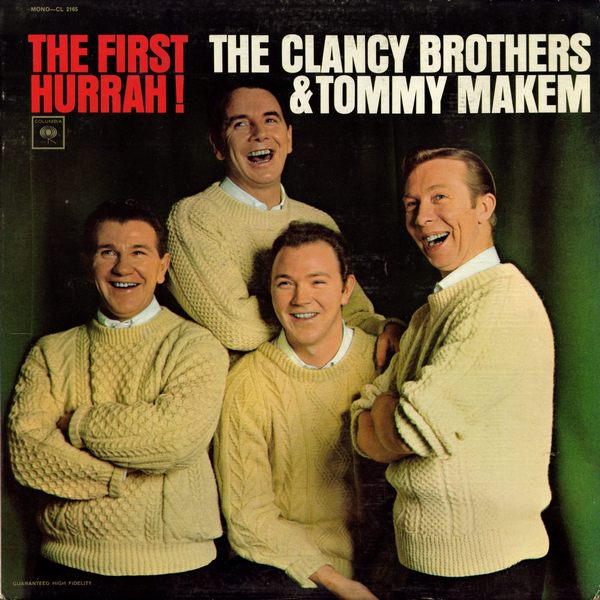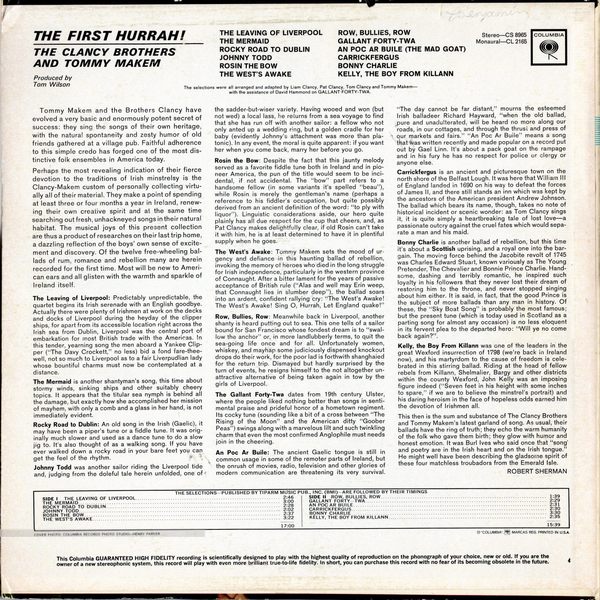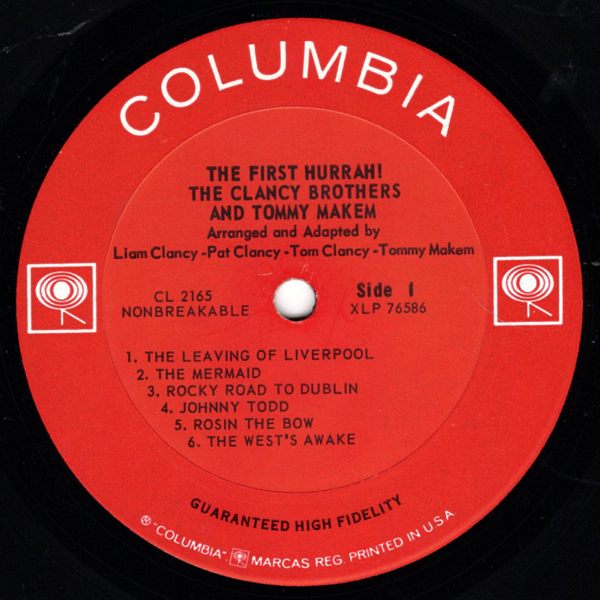

 |



|
Sleeve Notes
Tommy Makem and the Brothers Clancy have evolved a very basic and enormously potent secret of success: they sing the songs of their own heritage, with the natural spontaneity and zesty humor of old friends gathered at a village pub. Faithful adherence to this simple credo has forged one of the most distinctive folk ensembles in America today.
Perhaps the most revealing indication of their fierce devotion to the traditions of Irish minstrelsy is the Clancy-Makem custom of personally collecting virtually all of their material. They make a point of spending at least three or four months a year in Ireland, renewing their own creative spirit and at the same time searching out fresh, unhackneyed songs in their natural habitat. The musical joys of this present collection are thus a product of researches on their last trip home, a dazzling reflection of the boys' own sense of excitement and discovery. Of the twelve free-wheeling ballads of rum, romance and rebellion many are herein recorded for the first time. Most will be new to American ears and all glisten with the warmth and sparkle of Ireland itself.
The Leaving of Liverpool: Predictably unpredictable, the quartet begins its Irish serenade with an English goodbye. Actually there were plenty of Irishmen at work on the decks and docks of Liverpool during the heyday of the clipper ships, for apart from its accessible location right across the Irish sea from Dublin, Liverpool was the central port of embarkation for most British trade with the Americas. In this tender, yearning song the men aboard a Yankee Clipper ("The Davy Crockett," no less) bid a fond fare-thee-well, not so much to Liverpool as to a fair Liverpudlian lady whose bountiful charms must now be contemplated at a distance.
The Mermaid is another shantyman's song, this time about stormy winds, sinking ships and other suitably cheery topics. It appears that the titular sea nymph is behind all the damage, but exactly how she accomplished her mission of mayhem, with only a comb and a glass in her hand, is not immediately evident.
Rocky Road to Dublin: An old song in the Irish (Gaelic), it may have been a piper's tune or a fiddle tune. It was originally much slower and used as a dance tune to do a slow jig to. It's also thought of as a walking song. If you have ever walked down a rocky road in your bare feet you can get the feel of the rhythm.
Johnny Todd was another sailor riding the Liverpool tide and, judging from the doleful tale herein unfolded, one of the sadder-but-wiser variety. Having wooed and won (but not wed) a local lass, he returns from a sea voyage to find that she has run off with another sailor: a fellow who not : only anted up a wedding ring, but a golden cradle for her baby (evidently Johnny's attachment was more than platonic). In any event, the moral is quite apparent: if you want her when you come back, marry her before you go.
Rosin the Bow: Despite the fact that this jaunty melody served as a favorite fiddle tune both in Ireland and in pioneer America, the pun of the title would seem to be incidental, if not accidental. The "bow" part refers to a handsome fellow (in some variants it's spelled ''beau"), while Rosin is merely the gentleman's name (perhaps a reference to his fiddler's occupation, but quite possibly derived from an ancient definition of the word: "to ply with liquor"). Linguistic considerations aside, our hero quite plainly has all due respect for the cup that cheers, and. as Pat Clancy makes delightfully clear, if old Rosin can't take it with him. he is at least determined to have it in plentiful supply when he goes.
The West's Awake: Tommy Makem sets the mood of urgency and defiance in this haunting ballad of rebellion, invoking the memory of heroes who died in the long struggle for Irish independence, particularly in the western province of Connaught. After a bitter lament for the years of passive acceptance of British rule ("Alas and well may Erin weep. that Connaught lies in slumber deep"), the ballad soars into an ardent, confident rallying cry: "The West's Awake! The West's Awake! Sing O, Hurrah, Let England quake!"
Row, Bullies, Row: Meanwhile back in Liverpool, another shanty is heard putting out to sea. This one tells of a sailor bound for San Francisco whose fondest dream is to "swallow the anchor" or, in more landlubberly terms, to quit the sea-going life once and for all. Unfortunately women. whiskey, and mayhap some judiciously dispensed knockout drops do their work, for the poor lad is forthwith Shanghaied for the return trip. Dismayed but hardly surprised by the turn of events, he resigns himself to the not altogether unattractive alternative of being taken again in tow by the girls of Liverpool.
The Gallant Forty-Twa dates from 19th century Ulster. where the people liked nothing better than songs in sentimental praise and prideful honor of a hometown regiment. Its cocky tune (sounding like a bit of a cross between "The Rising of the Moon" and the American ditty "Goober Peas") swings along with a marvelous lilt and such twinkling charm that even the most confirmed Anglophile must needs join in the cheering.
An Poc Ar Buile: The ancient Gaelic tongue is still in common usage in some of the remoter parts of Ireland, but the onrush of movies, radio, television and other glories of modern communication are threatening its very survival. "The day cannot be far distant," mourns the esteemed Irish balladeer Richard Hayward, "when the old ballad, pure and unadulterated, will be heard no more along our roads, in our cottages, and through the thrust and press of our markets and fairs." "An Poc Ar Buile" means a song that was written recently and made popular on a record put out by Gael Linn. It's about a pack goat on the rampage and in his fury he has no respect for police or clergy or anyone else.
Carrickfergus is an ancient and picturesque town on the north shore of the Belfast Lough. It was here that William III of England landed in 1690 on his way to defeat the forces of James II, and there still stands an inn which was kept by the ancestors of the American president Andrew Johnson. The ballad which bears its name, though, takes no note of historical incident or scenic wonder: as Tom Clancy sings it, it is quite simply a heartbreaking tale of lost love — a passionate outcry against the cruel fates which would separate a man and his maid.
Bonny Charlie is another ballad of rebellion, but this time it's about a Scottish uprising, and a royal one into the bargain. The moving force behind the Jacobite revolt of 1745 was Charles Edward Stuart, known variously as The Young Pretender, The Chevalier and Bonnie Prince Charlie. Handsome, dashing and terribly romantic, he inspired such loyalty in his followers that they never lost their dream of restoring him to the throne, and never stopped singing about him either. It is said, in fact, that the good Prince is the subject of more ballads than any man in history. Of these, the "Sky Boat Song" is probably the most famous; but the present tune (which is today used in Scotland as a parting song for almost any occasion) is no less eloquent in its fervent plea to the departed hero: "Will ye no come back again?".
Kelly, the Boy From Killann was one of the leaders in the great Wexford insurrection of 1798 (we're back in Ireland now), and his martyrdom to the cause of freedom is celebrated in this stirring ballad. Riding at the head of fellow rebels from Killann, Shelmalier, Bargy and other districts within the county Wexford, John Kelly was an imposing figure indeed ("Seven feet in his height with some inches to spare," if we are to believe the minstrel's portrait) and his daring heroism in the face of hopeless odds earned him the devotion of Irishmen all.
This then is the sum and substance of The Clancy Brothers and Tommy Makem's latest garland of song. As usual, their ballads have the ring of truth; they echo the warm humanity of the folk who gave them birth; they glow with humor and honest emotion. It was Burl Ives who said once that "song and poetry are in the Irish heart and on the Irish tongue." He might well have been describing the gladsome spirit of these four matchless troubadours from the Emerald Isle.
ROBERT SHERMAN